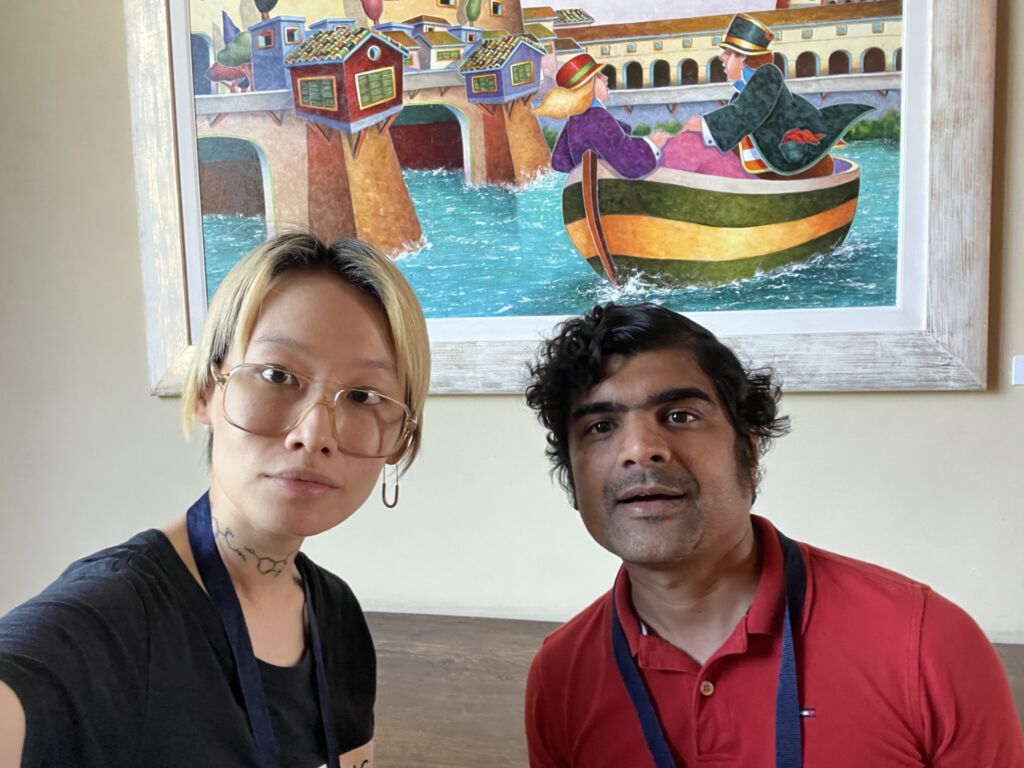AI Meets Neuroscience: IT:U’s Research Highlighted in Quanta Magazine
What if artificial intelligence (AI) could learn more like the brain? A recent feature in Quanta Magazine explores this exact question, spotlighting research co-led by IT:U Founding Professor Jie Mei and Professor Srikanth Ramaswamy (from Newcastle University and the Massachusetts Institute of Technology (MIT)). Their work brings neuroscience and AI closer together by modelling biological processes, such as neuromodulation, in artificial neural networks.
Neuromodulators and Learning
Neuromodulators are the brain’s “master switches”, which enable adaptation to ever-changing environments and task demands. Neuromodulators like dopamine, acetylcholine, and norepinephrine operate across temporal scales, from seconds to hours, fundamentally altering the computational properties of neural circuits. Building on this neurobiological foundation, Professors Mei and Ramaswamy have pioneered research into how the computational principles of neuromodulation can be systematically integrated into artificial neural networks. The implementation involves embedding artificial neuromodulatory signals that can adjust network parameters, learning rates, connection weights, and activation thresholds, based on performance feedback and environmental context. The results demonstrate AI systems that learn more flexibly, exhibiting several key advantages. These systems can switch between focused, exploitation-driven learning and broad, exploratory learning, mirroring the brain’s remarkable ability to balance stability and plasticity.
Implementing Brain-inspired Rules in AI models
The duo’s co-led studies show that applying biological principles — such as different neuron types, their firing properties and neuromodulatory mechanisms — improves both the performance and efficiency of AI systems. Their research is cited in Quanta Magazine as part of a broader shift in AI thinking: one that moves away from rigid imitation and toward a deeper appreciation for the complexity of biological intelligence.
“Systematically incorporating more biological principles into AI systems could address current limitations in reasoning and adaptability.”
– Prof. Srikanth Ramaswamy
Computational Neuroscience at IT:U
IT:U’s Computational Neuroscience Research Group, led by Prof. Jie Mei, focuses on bridging neuroscience, artificial intelligence, and systems thinking. As part of IT:U’s networked university model, the group collaborates closely with leading researchers and institutions worldwide, such as Prof. Srikanth Ramaswamy, to advance interdisciplinary research that transforms how machine learning, cognition, and human understanding are explored and applied. In addition, IT:U Prof. Nina Hubig also contributes to this mission with her work in Explainable AI, supporting efforts to build more transparent and interpretable neural models.
Beyond research publications, Prof. Jie Mei and Prof. Ramaswamy have made notable contributions to outreach and collaborative project activities such as:
- An invited article by the European Journal of Neuroscience on catalyzing the future of AI through brain-inspired principles
- Profs. Mei and Ramaswamy’s organization of the NeuroAI workshop at FENS Regional Meeting 2025
- Prof. Ramaswamy’s organization of the OIST Thematic Program on Neuromodulation of Adaptive Learning at the Okinawa Institute of Science and Technology, Okinawa, Japan.
- Two workshops at the Annual Computational Neuroscience Meeting (CNS2025) on Explainable AI for Understanding Biological Brains and Large-Scale Mechanistic Models of Brain Circuits from Biophysically Detailed to Simplified Representations
- Talk on the role of gain neuromodulation in layer-5 pyramidal neurons at CNS 2025
- A workshop on Quantifying and simulating multi-neuromodulatory dynamics in the biological brain at the International Conference on Neural Information Processing (ICONIP 2025) Okinawa, Japan
Further Reading:
📰 Read the full article in Quanta Magazine: AI Is Nothing Like a Brain — and That’s OK
📰 Papers cited in the article:
- Improving the adaptive and continuous learning capabilities of artificial neural networks: Lessons from multi-neuromodulatory dynamics
- Enhancing learning in spiking neural networks through neuronal heterogeneity and neuromodulatory signaling
More Info:
- IT:U’s Computational Neuroscience Research Group led by Prof. Jie Mei
- Prof. Srikanth Ramaswamy’s Research Group at the Faculty of Medical Sciences, Newcastle University
- About Quanta Magazine:
Quanta Magazine is an editorially independent publication funded by the Simons Foundation. Widely respected in the scientific community, it was awarded the 2022 Pulitzer Prize in Explanatory Reporting for its exceptional science journalism. Quanta offers in-depth and accessible reporting on major breakthroughs in mathematics, physics, biology, and computer science, making complex ideas engaging and understandable for a broad audience.
https://www.quantamagazine.org
